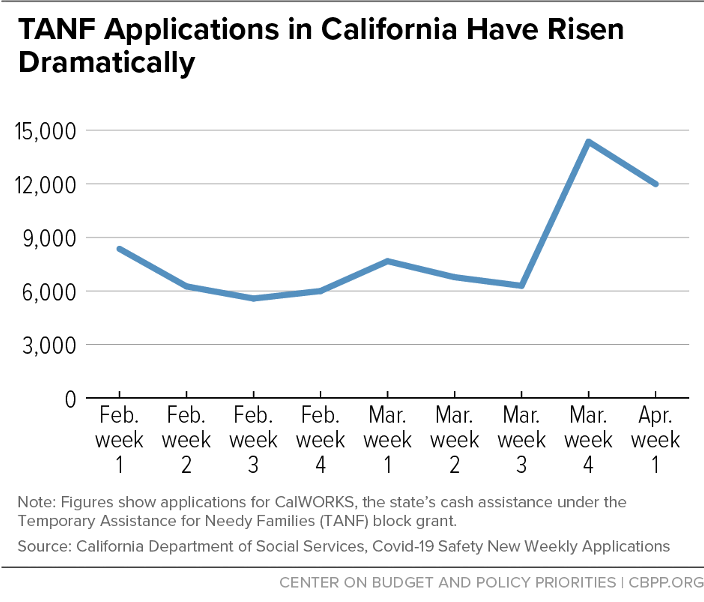BEYOND THE NUMBERS
The number of people in need who are applying for help under the Temporary Assistance for Needy Families (TANF) program is on track to grow quickly and dramatically during the economic downturn, early data suggest, and federal policymakers should take steps to ensure that TANF continues providing a lifeline to families during what will likely be a long economic recovery.
The cash income that TANF provides to help families meet their basic needs matters to children’s long-term success — and it’s especially important at times of crisis and high stress.
In California, Vermont, and Washington, applications have more than doubled since the beginning of March; in Minnesota, applications in the last week of March were about 75 percent above last year’s level. With applications rising so quickly, federal policymakers should take the following steps:
- Give states money to meet increased need. The TANF block grant has lost about 40 percent of its value due to inflation since its creation in 1996 and, while some states have substantial unspent funds with which to meet the increased demand, most don’t. Policymakers should expand this year’s block grant by 30 percent or create a $5 billion emergency fund that reflects lessons from the TANF Emergency Fund — a temporary fund that policymakers created during the Great Recession and that states used to provide additional monthly cash payments, short-term emergency assistance, and subsidized jobs.
-
Suspend work requirements, sanctions, and time limits. Although states have great flexibility in how they spend their TANF funds and operate their TANF programs, federal law imposes penalties if a state doesn’t meet a work participation rate, cut benefits for parents who don’t meet a work requirement, or follow federal time limits on benefits. States can suspend these requirements to meet social distancing guidelines and stay-at-home orders, and some have. But others have been reluctant to do so while the federal requirements remain in place.
Policymakers should suspend the work-related requirements at least through the end of the year. They also should suspend time limits on benefits until the labor market substantially recovers. And they should empower the U.S. Department of Health and Human Services to enforce the suspensions by imposing financial penalties on states that don’t comply.
- Pause child support cooperation requirements. To protect survivors of domestic violence who may decide that seeking child support would threaten their or their children’s safety, policymakers should suspend the requirement that TANF applicants cooperate with efforts to establish and enforce child support orders. Many parents are now applying for TANF by phone, and domestic violence victims may not develop enough trust with their caseworker to feel comfortable providing this information. And, experts are concerned that stay-at-home orders could fuel a rise in domestic violence, so it’s particularly important to help those seeking aid as they leave relationships.
- Prevent states from narrowing eligibility and cutting benefits. During the Great Recession, some states restricted TANF eligibility (for example, by shortening time limits on benefits or narrowing the criteria for time limit exemptions) and cut benefits to help address their budget shortfalls. Policymakers must not allow that to happen again. TANF already serves only a fraction of families in need due to its extremely restrictive policies; the pandemic and its economic fallout is no reason to further weaken its reach. In exchange for giving states more money, the federal government should bar them from enacting policies that are more restrictive than those in place when the pandemic started.

